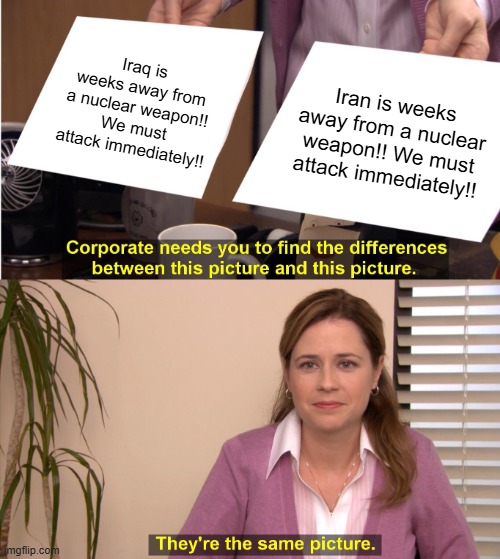Really?
You cant see the parrarells in the rhetoric? Because i disagree..
'Axis of Evil' ::: Jan. 29, 2002
President Bush accuses Iraq of being part of an international "axis if evil" during his
State of the Union address. Bush tells Congress:
"Iraq continues to flaunt its hostility toward America and to support terror. The Iraqi regime has plotted to develop anthrax and nerve gas and nuclear weapons for over a decade … This is a regime that has something to hide from the civilized world."
Material Breach' ::: Nov. 8, 2002
U.N. Security Council
Resolution 1441 says Iraq "remains in material breach of its obligations" under various U.N. resolutions and gives the country "a final opportunity to comply with its disarmament" commitments.
The U.N. Moves Back In ::: Nov. 27, 2002
UNMOVIC and IAEA inspections begin again in Iraq, almost four years after the departure of inspectors prior to Operation Desert Fox.
No 'Smoking Guns' ::: Jan. 9, 2003
UNMOVIC's Hans Blix and the IAEA's Director General Mohamed ElBaradei report their findings to the U.N. Security Council.
Blix says inspectors have not found any "smoking guns" in Iraq. ElBaradei reports that aluminum tubes suspected by the U.S. to be components for uranium enrichment are more likely to be parts for rockets, as the Iraqis claim. John Negroponte, U.S. Ambassador to the U.N., says:
"There is still no evidence that Iraq has fundamentally changed its approach from one of deceit to a genuine attempt to be forthcoming in meeting the council's demand that it disarm."
Sixteen Words ::: Jan. 28, 2003
In his
State of the Union address, President Bush continues to view Iraq is a WMD threat. He makes a statement that implies Iraq is trying to develop nuclear weapons. Bush says:
"The British government has learned that Saddam Hussein recently sought significant quantities of uranium from Africa."
It comes to light later that the president based his statement on discredited intelligence.
Powell's U.N. Appearance ::: Feb. 5, 2003
U.S. Secretary of State Colin Powell goes in person to the U.N. to
make the case against Iraq. Citing evidence obtained by American intelligence, he tells the U.N. that Iraq has failed "to come clean and disarm." Powell adds:
"My colleagues, every statement I make today is backed up by sources, solid sources. These are not assertions. What we're giving you are facts and conclusions based on solid intelligence."
Another disproven " fact "
The Burden is on Iraq ::: Feb. 14, 2003
The IAEA's ElBaradei and chief weapons inspector Blix report to the U.N. Security Council on Iraqi cooperation in the search for WMD.
They say they have not discovered any biological, chemical or nuclear weapons activities. Proscribed missile programs are discovered and disabled. Blix does express frustration with Iraq's failure to account for its vast stores of chemical and biological agents it was known to have at one point. Blix says:
"This is perhaps the most important problem we are facing. Although I can understand that it may not be easy for Iraq in all cases to provide the evidence needed, it is not the task of the inspectors to find it."
U.S. vs. U.N. ::: March 6-7, 2003
The night before Blix and ElBaradei are to report on inspection efforts in Iraq, President Bush gives a news conference in which he again says Iraq is hiding something. Bush says:
"These are not the actions of a regime that is disarming. These are the actions of a regime engaged in a willful charade. These are the actions of a regime that systematically and deliberately is defying the world."
Blix tells the U.N. the next day:
"Intelligence authorities have claimed that weapons of mass destruction are moved around Iraq by trucks, in particular that there are mobile production units for biological weapons … [But] no evidence of proscribed activities have so far been found."
Appearing with Blix, ElBaradei tells the U.N. that the IAEA has concluded that documents appearing to show Iraq shopping for uranium in Niger are, in fact, forgeries.
Invading Iraq ::: March 20, 2003
The U.S. military and other members of an American-led coalition invade Iraq. Baghdad falls on April 9. President Bush declares an end to major combat operations on May 1. Shortly afterward, the
Pentagon announces formation of the Iraq Survey Group (ISG) to search for WMD.
No Weapons Found ::: Oct. 2, 2003
After three months of looking, Iraq Survey Group (ISG) inspector
David Kay tells Congress in an interim report that his American team of weapons inspectors has yet to find any evidence of WMD. Kay says:
"We have not yet found stocks of weapons, but we are not yet at the point where we can say definitively either that such weapon stocks do not exist, or that they existed before the war."


